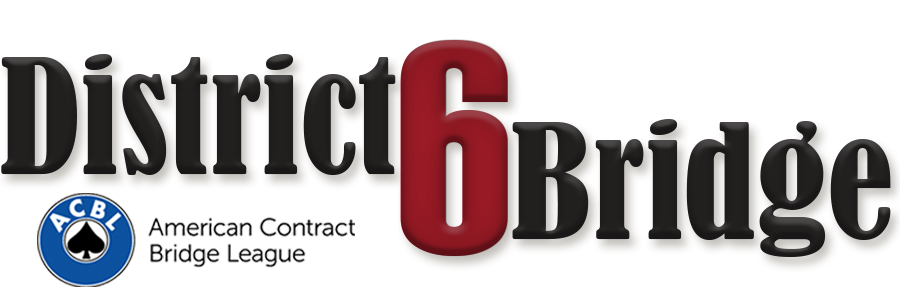(From time to time, we will republish a bridge column from the past. This first appeared in the August/September 2008 issue of Table Talk.)
First off, let me state emphatically that I’m not always a good partner. I sometimes violate the following guidelines when the game’s frustrations get the best of me. That said, I’m better than I used to be and am always working to improve. I hope my partners agree!
These “rules” are not new. I’ve collected them from a variety of sources including my own experience and my partners. Thanks to Eddie Kantar’s Bridge for Dummies and Marty Bergen’s Points Schmoints for additional ideas.
Rule Number 1
Eliminate the word “WHY” from your partnership vocabulary. I heard this tip at the American Bridge Teacher’s Conference in Las Vegas. It becomes more profound the more you think about it. Saying “Why did you…?” or “Why didn’t you….?” is a challenge and/or insult to partner’s play and intelligence and immediately puts them on the defensive. Whenever my partner asks me a question like this, I think to myself, “Because I thought I was doing the right thing.” Or, “Because I’m a moron.” Or, “Because I wanted to annoy you and I came here today to lose!” None of these feelings help me play better. Making partner defensive is counter to discussing the problem and solving it for next time.
Rule Number 2
Do not discuss errors at the table. If there’s a bidding misunderstanding, you might say, something like “We’re playing Cappelletti, right?” just to make sure you don’t repeat the same error on the next hand and you’re clear on your understandings. It’s important to say it in a calm, impassionate, non‑accusatory voice. After all, perhaps YOU had your agreement wrong.
Rule Number 3
Smile, your partner will play better. I have a button that says this and I should wear it more often. Even if you’ve just had the worst disaster imaginable, just put your cards away, score it up, smile at your partner, and play the next hand. Most times partner KNOWS he’s made a mistake and is embarrassed or angry at themselves already. By being pleasant, you can get past that hand and maybe, just maybe, partner will forget about it in time to play well on the next hand. Grousing or sulking just makes partner worry about YOU, lose concentration and then make MORE errors on following hands. By the end of the session, partner is worn out and has ceased to care about anything.
Rule Number 4
If you’re not having fun, you’re doing it wrong. This pithy saying comes from the author of the “Instant Bridge” program Steve Forsythe and it’s SO true. It IS just a game after all. We purportedly play it for enjoyment! Find a way to have a good time. If you can, kid about things with your partner to relieve the tension. Jose Cortina and I alert our own bid when we pre-empt. The explanation is “partner has a void or singleton in my suit”. You have to be careful with this because the opponents may take offense, but it’s an inside joke with us, and we have a good time with it since it happens so often! Here’s a quote from bridge legend Charles Goren: “Bridge is for fun. You should play the game for no other reason. You should not play bridge to make money, to show how smart you are, or show how stupid your partner is, or to prove any of the several hundred other things bridge players are so often trying to prove.”
Rule Number 5
When partner puts down dummy, say “Thank you partner, nice hand.” I learned this from one of my best partners, Mike Spooner. He says it EVERY time I put down dummy. It’s remarkable how much better I play! And the opponents think it’s exactly what you expect and need. Force yourself. Say it as if you mean it.
Rule Number 6
Treat your partner like a friend. They’ll play better if your time away from the table is pleasant. After all, they’re the only other person at the table who’s on your side!
Rule Number 7
KISS – Keep It Simple Stupid. You have your favorite bidding gadgets and your partner has theirs. Agree to disagree. Ask them to play ONE new convention in trade for your playing ONE of theirs. I’ve learned this through bitter experience. Loading up their card with your favorite stuff (and yours with theirs) causes unnecessary angst that there’s going to be a bidding disaster. Believe me, this becomes a self‑fulfilling prophecy. Keep your card simple until you’re an established partnership, then start adding new conventions by mutual agreement one-by-one. Also, my rule is that the more experienced player plays the less experienced player’s methods, not the other way around. The less experienced player is more likely to forget new conventions and methods in the heat of the moment.
Rule Number 8
Corollary to number 7 – once you’ve agreed to something, ‑ STICK TO IT! Don’t go back on your word. You agreed to partner’s methods so play them. I play with some partners that open the bidding on air and others who want a solid opening bid. Either philosophy can win on any given day, but don’t switch horses in the middle. If you always have the hand you promised while filling out your card, partnership trust will grow and you’ll have fun and good games. As soon as you violate your agreements and start bidding undisciplined outliers, you create doubt in partner’s mind and then they start to wonder about every bid you make. Another partner of mine, Frank Cardillo, once said to me (paraphrased), “What makes long‑lasting partnerships so difficult is that you have a history with them. You remember every undisciplined bid they’ve ever made and now wonder if they’re doing it again.” It’s a profound statement. Use bridge Zen – close your eyes, clear your mind, give in to “The Force” and trust your partner. Forgive and forget the sins of the past. Do your best to remember and adhere to your agreements including style.
Rule Number 9
Don’t argue, ask an expert. Time after time I’ve seen two people arguing their way of thinking versus their partner’s and they’re both wrong! Let it go until later and get on with the next hand. There are lots of expert players out there who are delighted to give you their input. Ask more than one person since opinions often vary. By the way, it’s considered bad etiquette to criticize your partner to others. Give the expert BOTH hands and don’t identify who held which one.
Rule Number 10
Keep your emotions in check. No sighing. No facial expressions. No slapping, throwing, or snapping cards on the table. No rolling the eyes. It’s embarrassing and annoying to everyone at the table. And, it can be construed as passing unauthorized information. Partner will notice and will NOT be amused.
Rule Number 11
Don’t point it out when partner misplays or misdefends a hand. Sometimes you’re just bursting to say something. Forget the sarcasm. I’ve found that what works for me is to simply say “unlucky”. After all, partner’s line of play COULD have worked on a different day. Often it WAS unlucky. Maybe he saw or knew something you didn’t. Maybe he had a guess and picked wrong. We all do it. Better yet, find a way to share the blame. “Sorry partner, I should have read your card as encouraging.”
Rule Number 12
Admit it when you make a mistake. Partner was just about to say something when you say “Darn, I should have cashed the good spade while I was on dummy. I got one trick ahead of myself.” This removes the temptation from partner to say something he’ll regret. Own up to your errors before partner points them out. In particular, it’s VERY bad form to pass the blame for your own mistake onto partner. Nothing will send your game into a tailspin faster.
Rule Number 13
Look for ways to compliment partner. If they play a hand well, say “Nicely played” (high‑fiving and laughing however are out of bounds and considered gloating). If partner defends a hand well, say “Thank you for returning the Queen of Clubs. It made it easy for me to do the right thing.” Partner wants you to be happy and will play much better when he KNOWS you are.
Rule Number 14
Don’t “result” partner. This is a particular pet peeve of mine, and I refuse to play with people who practice this habit. Sometimes a hand can be bid, played or defended in an unusual fashion to get a great result. Don’t criticize when partner takes the normal line of play and it doesn’t work or when partner has a 50/50 guess and guesses wrong. Bridge is a game of percentages. It’s common for the percentage play to fail (NO play is 100%) and it’s very easy to see what COULD have happened after the hand is over. You have that luxury but partner didn’t while the hand was in progress.
Rule Number 15
Trust your partner, not the opponents. Assume partner has done something smart, not stupid. The opponents will false card you and try to throw a monkey wrench into your bidding and defensive machinery. Don’t fall for it. Remember who’s on your side. Corollary: Never side with an opponent against your partner. If you can’t support your partner, keep quiet.
I suggest you reprint this article and show it to your current and future partners. Make a copy for them too. It’s almost as important as your convention card!

